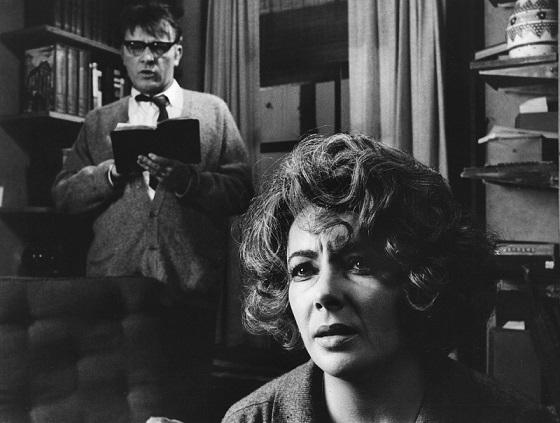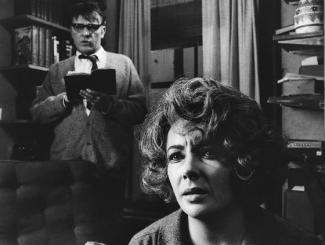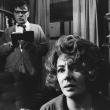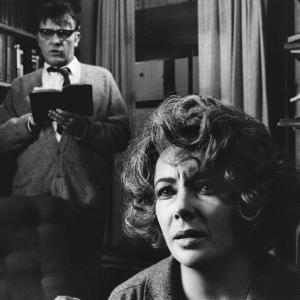Elizabeth Taylor 4-Film Collection
Elizabeth Taylor 4-Film Collection (1950-1967, Warner Archive Collection, 5 Blu-rays, NR, 537 min.). Elizabeth Taylor is celebrated in this collection of four of her most memorable film performances. Spencer Tracy plays her father in the wedding comedy “Father of the Bride,” Van Johnson is her love interest in the poignant romance “The Last Time I Saw Paris,” while she won an Oscar performing opposite then-husband Richard Burton in “Who’s Afraid of Virginia Woolf?” and plays an embittered Army wife opposite Marlon Brando in “Reflections in a Golden Eye.” Reviews of the four films follow.
“Father of the Bride” (1950, 92 min.). Based on the same-named 1949 novel by Edward Streeter, which has spawned two other film versions and three sequels, this was the original one, directed by Vincent Minelli and starring Spencer Tracy and Joan Bennett as parents Stanley and Ellie Banks and Elizabeth Taylor and Don Taylor as the engaged couple, Kay Banks and Buckley Dunstan.
Rounding out the main cast are Billie Burke and Moroni Olsen as Buckley’s parents, Doris and Herbert Dunstan; Russ Tamblyn (“West Side Story,” “Peyton Place”) and Tom Irish (“Father’s Little Dividend,” the 1991 “Father of the Bride”) as Kay’s brothers, Tommy and Ben; and Leo G. Carroll (“North by Northwest,” TV’s “The Man from U.N.C.L.E.”) as caterer Mr. Massoula.
Tracy (“Inherit the Wind,” “Guess Who’s Coming to Diner,” “Judgment at Nuremberg”) opens the film by speaking directly to the audience amidst the debris from having just hosted the wedding reception (total cost of $3.75 of per head for 572 attendees, which would be a bargain today). He continues narrating throughout, as he initially was against the marriage and then tried to pare down the costs whenever possible. As Stanley, Tracy always manages to convey his sad recognition that this wedding marks the passage of time and his own mortality. Much more supporting the wedding, and spending, is his wife Ellie (Bennett of “Scarlet Street”).
Elizabeth Taylor, coming off “Little Women,” is radiant as Kay, while Don Taylor (no relation to Elizabeth) is a bit lost as Buckley, although he does have one sit-down financial talk with her father. In fact, Elizabeth Taylor had the first of her eight marriages just days before the film was released. Film of that wedding to Conrad Hilton Jr. is included as an extra (1:24). The other extra is Tracy, Bennett and E. Taylor meeting President Harry S. Truman (1:12). Both videos lack audio.
The comedy actually is subdued, mostly confined to when Minnelli orchestrates crowd choreography. One example is the engagement party, where Stanley becomes trapped in his own kitchen mixing drinks for an endless parade of guests and, thus, never gets to make his prepared speech. On the morning of the wedding, the house is invaded by Mr. Missoula's minions, colliding and arguing with the movers who are clearing the house of furniture so that it can accommodate the enormous guest list. Minnelli covers the reception itself in a fluid, unbroken overhead shot over the entirety of the Banks property, all overrun by partygoers. There, the external chaos mirrors Stanley's inner state as he rushes through the crowd and doors, trying to reach Kay to say goodbye.
The film became one of 1950’s top-grossing films and was nominated for three Oscars: Best Picture, Best Actor (Tracy) and Best Screenplay (Frances Goodrich and Albert Hackett). Grade: film 4 stars; extras 1 star
“The Last Time I Saw Paris” (1954, 116 min.). The film, directed by Richard Brooks, is an adaptation of F. Scott Fitzgerald’s “Babylon Revisited” and features a star-studded cast. Elizabeth Taylor and Donna Reed play sisters, respectively Helen and Marion Ellswirth, who fall for the same man, The Stars & Stripes reporter Lt. Charles Wills (Van Johnson of “The Caine Mutiny,” “Brigadoon”). Charles choses Helen, but, despite the birth of daughter Vicki, the marriage eventually goes downhill.
The opening has Charles returning to Paris after being home in America for two years. The lengthy flashback that follows begins in Paris, just after victory in Europe has been declared in World War II. Helen happens to be one of the women in the crowded square who hug and kiss a passing Charles. They reconnect during a party at her father’s house. Walter Pidgeon (“Funny Girl,” “Forbidden Planet”) plays dad James Ellswirth, initially constantly broke, but fond of betting on the horses.
Even when Charles and Helen come into money, and he has given up his novel writing after three manuscripts have been rejected, their separate pursuits of hedonistic pleasure just make their marriage worst. At one point, Charles is hanging around the often-married Lorraine Quarl (Eva Gabor of TV’s “Green Acres”) and Helen starts an affair with young, handsome tennis player Paul (future James Bond Robert Moore).
Kurt Kasznar (“Casino Royale,” “Kiss Me Kate”) plays owner Maurice of the cafe they frequent and where there is a painting of Helen jumping in one of Paris’ fountains. The sole extra is “Touche Pussycat,” a Tom & Jerry cartoon (6:42). Grade: film 3 stars; extra 1.25 stars
“Who’s Afraid of Virgina Woolf?” (1966, 130 min.). This film, along with Michelangelo Antonioni’s “Blow-Up” of the same year, are credited by Jack Valenti, in the extras, for spurring him into the creation of the still-existing film rating system in 1968. Based on Edward Albee’s 1962 play, which often was considered unfilmable due to language and emotional violence, and helmed by first-time director Mike Nichols (who would direct “The Graduate” the following year), the film is one of my favorites, which I first saw as a just-turned 18-year-old with my mother during its initial run. I even have the film’s dialogue as a vinyl release.
Married couple Richard Burton (“Becket,” “The Spy Who Came in From the Cold,” “Equus,” “Exorcist II: The Heretic,” “Anne of the Thousand Days”) and Elizabeth Taylor play married couple George, an associate professor of history at a college in New Carthage, and Martha, daughter of the college’s president. The couple have a tempestuous marriage, in which they have resorted to playing verbal games to both amuse themselves and keep some sparks in their marriage, in which the sex has apparently grown stale.
After one of her father’s reception, new hire Nick, a biology professor, and his timid wife Honey are invited over by Martha, even though it already is 2 a.m. The younger couple is played by George Segal (“Where’s Poppa?” and “The Cable Guy”) and Sandy Dennis (“The Out of Towners,” “Up the Down Staircase”).
Martha, it is revealed, married George when he appeared to be a rising star in academia. Life has disappointed them both, but they remain partners in their disenchantment, filling their days and nights with barbs, banter and affection. Martha later confides to a near-stranger that George is the only man she has ever loved. Meanwhile, George, who initially appears to be beaten down by his wife's brassy extroversion, gradually reveals hidden reserves of aggression. Some reviews have pointed out that the couple bears the names of America's founding President and First Lady, which could be an intentional irony, with their imagined child as our country.
During the film’s one night, the delicate balance of their marriage is upset by the younger couple, with Martha mistakenly thinking Nick is in the math department. George immediately suspects Martha does not care what subject he teaches, only that he is young and well built. Honey, who cannot hold her bourbon – “never mix, never worry” -- seems mismatched with her former quarterback husband.
As the drunken evening progresses, Martha rapidly exceeds the customary boundaries of the loaded repartee which she and George use. She pushes too hard, says too much and lurches into prohibited topics, such as their imaginary son. As George rises to the provocation, the evening turns violent, a little physically, but more emotionally, by two highly articulate people who know each other's weak spots. Martha also cheats on George with Nick, who does not live up to her standards as a lover. George does however sniff out the younger couple's weaknesses and hammers on the fractures in their marriage.
Nichols uses Albee’s written play with trims for running time and a few word substitutes, but has Haskel Waxler’s camera roam throughout George and Martha's house -- the play was confined to their living room – and ventures into the front and backyard, and even follows the foursome to a roadside bar for dancing, more drinks and several of the night's most brutal confrontations.
There are many classic lines I love, including Martha’s early Bette Davis imitation, using “What a dump.” Later, when George accuses Martha of being a monster, she replies, "I'm loud and I'm vulgar and I wear the pants in the house because somebody's got to. But I am not a monster!” Here, Taylor's delivery conveys both Martha's furious denial and her frightened suspicion that a monster is what she has become.
All four of the main cast were nominated for Oscars, with Taylor winning, and the film was the second in history to be nominated in every category for which it was eligible (13 in all, winning five Oscars). The other Oscars went to Dennis as Best Supporting Actress, Wexler for Best Cinematography, Richard Sylbert and George James Hopkins for Best Art Direction-Set Direction, and Irene Sharaff for Best Costume Design. It was the first film to carry an explicit warning that no one under 18 would be admitted without an accompanying adult.
The extras include two audio commentaries, one by director Nichols with Steven Soderbergh and the other by cinematographer Wexler; a look at the film being too shocking for Hollywood of the time with Valenti (19:37); a making-of with Richard Schickel, Albee, screenwriter Ernest Lehman, part of Dennis’ screentest with Roddy McDowall and the discussion that Taylor was 20 years too young and Burton was 5 years too old for their roles (20:14); Nichols’ NBC interview from Jully 29, 1966 (9 min.); Dennis’ screentest (7:13); and a documentary portrait of Taylor, narrated by Peter Lawford (66:31). Grade: film 5 stars; extras 4.5 stars
“Reflections in a Golden Eye” (1967, 108 min.). The film, actually the weakest of set, is presented on two discs. One is director John Huston’s original version that has a gold-hue, which was only shown for one week, before it was replaced by the full-color version, which is available on the other Blu-ray. Huston’s original version has all the scenes suffused with the color gold, with one object in each scene appearing normally colored. This was done in reference to the houseboy Anacleto's statement about his golden peacock drawing that the world is just a reflection in the eye of the golden peacock.
The weird, to put it nicely, film was based on a book by Carson McCullers (“The Heart is a Lonely Hunter”), who died two weeks before the film’s U.S. premiere. The film opens with a McCullers’ quote about a murder on a military base, but the murder is not shown until the final scene. Lots of weirdness ensues in between.
The film stars Elizabeth Taylor as Leonora Penderton, married to Major Weldon Penderton (Marlon Brandon with a strange accent that makes some of his early dialogue unfathomable).
Their next-door neighbors on the southern U.S. Army base are Lt. Col. Morris Langdon and wife Alison Langdon, played by Brian Keith (“The Parent Trap,” “The Wind and the Lion”) and Julie Harris (“The Haunting,” “East of Eden,” TV’s “Knots Landing”). It is they who have Filipino houseboy Anacleto (Zorro David in his only major role).
Leonora is obviously fed up with her marriage to stone-faced Weldon, why she even plays footsie with Morris under the card table, even as both spouses are sitting nearby. Later, her cheating with Morris is made more explicit, including a post-sex scene in a convertible. Alison is aware of Morris’ cheating and ultimately decides to leave him.
The other main character is Pvt. L.G. Williams (Robert Forster of “Jackie Brown,” “Olympus Has Fallen,” “Mulholland Drive”), whose job apparently is to take care of the horses owned by the Pendertons. Williams has some strange behaviors. He likes to ride horses nude, bringing a new meaning to riding bareback, and he often is sunbathing nude on rocks in the woods. Both of which Major Penderton sees and seems to be fascinated with, so much so that he sometimes follows Williams. This brings up an unresolved homosexual issue.
Meanwhile, Williams does some stalking of his own. Many a night, he sneaks into the Penderton home and then into Leonora’s bedroom to watch her and hold her clothing. Yes, the Pendertons sleep in separate rooms.
Be warned that there is a scene in which Major Penderton violently whips a horse, which causes Leonora later to whip her husband across his face (yeah!).
Perhaps Brando’s best moment is when he does a soliloquy on the joys of being an enlisted man during the class he is teaching.
The sole bonus is a vintage behind-the-scenes video (23:09), minus sound, which is on the disc with Huston’s original version. Grade: film 2 stars; extra 1.5 stars
Rating guide: 5 stars = classic; 4 stars = excellent; 3 stars = good; 2 stars = fair; dog = skip it
Exact Revenge (The Eunuch + The Deadly Knives Double Feature) (Hong Kong, 1971-72, Eureka!, Blu-ray, NR, 98/86 min.). Both films from the Shaw Brothers Studio deal with a revenge story. They were made just as the wuxia film was giving way to the kung fu movie in the wake of Bruce Lee’s international success. This marks the two films’ first Blu-ray release.
In “The Eunuch” (1971, 98 min.), the title character, Gui De-hai (Pai Ying of “A Touch of Zen,” “The Valiant Ones”), survives an assassination attempt ordered by the Emperor (screenwriter Lo Wei). Gui then kills the Emperor’s wife and infant child. Before Gui can kill the Emperor, he stabs himself. The only trouble is the Emperor’s son, Prince Zhu Jin (Tsung Hua of “Sacred Knives of Vengeance”), is away studying.
The film never makes it clear why the Eunuch has so much power. However, he does send men to find and kill Prince Zhu. At one point, Gong-sun (Yang Chi-ching, an old man with a green bamboo staff, fights more than a dozen to protect Prince Zhu.
Meanwhile, Gui’s estranged father reappears after 20 years to reveal that Gui has a daughter (Yan-yan, played by Lisa Chiao Chiao), a secret that could jeopardize his standing. Gui murders his father, as his former wife killed and attempts to have Yan-yan killed to bury the truth, but she is rescued by the Old Lady of Green Bamboo Forest, also a skilled pole fighter. The two masters unite with their new students, preparing them for a confrontation with Gui, with each student seeking revenge.
The film has a couple of good fights – the one with Gong-sun, a late one with Yan-yan battling 10 and then Gui versus Prince Zhu that has a lot of wire work – but the merging of the two stories seems rushed, even as the film seems to lag at times. The only extra is audio commentary by Mike Leeder and Arne Venema.
“The Deadly Knives,” aka “Fists of Vengeance” (1972, 86 min.), which also comes with an English dub, is a more modern tale that starts with young lovers Guan Yue-hua (Ching Li of “Dynasty of Blood,” “Four Riders”) and Yan Zi-fei (Ling Yun of “Killer Clans,” “Death Duel”) riding home on a train. The train is soon filled with unruly Japanese, who start bothering a couple of young women. This causes Yan to fight the Japanese.
The film has a “Romeo and Juliet” theme, as Guan’s father seeks to sell lumber to the occupying Japanese military through Ogawa (Ching Miao). However, that forest is owned by Yan’s father, who refuses to sell. Ogawa bribes the Mayor, but says he needs Master Yan’s seal and land deed. Xu Qian, who already has attacked Jiao Jiao, Yan’s foster sister, in her bed, agrees to steal the seal and deed. Xu Qian, another foster child of Master Yan, then kills his foster dad.
Poor Jiao Jiao gets attacked a second time in bed, some of the unnecessary sex scenes added to the film, which was directed by Jang Il-ho. There also is a water torture scene, with a man tied to a water wheel.
I’m not sure why, but the Japanese also attack Yan’s martial arts school and residence, which makes for a couple of gang fights, but to me the fights are not very complicated, and thus are not engaging. The only character I really cared about was servant Doggie.
The film comes with audio commentary by Frank Djeng and a video essay by Jonathan Clements, which ties in President Richard Nixon’s visit to China with the film’s anti-Japanese angle (13:27). There also is a booklet with an essay by James Oliver about “The Eunuch” and an essay by Camille Zaurin on “The Deadly Knives.” Grades: The Eunuch 3 stars; The Deadly Knives 2 stars; extras 2.75 stars
Hong Kong 1941 (Hong Kong, 1984, Eureka! The Masters of Cinema Series, Blu-ray, NR, 100 min.). This is another romance film dealing with a Japanese occupation, this time of Hong Kong, when the city was still under British rule. While billed as a romantic triangle, it really isn’t until very late, when the female initiates a kiss with the second man. That woman (Cecilia Yip of “To Be Number One,” “Love Never Ends” as Ha Yuk-nam) also narrates the film, telling her story of the occupation.
Ha is being wooed throughout the film by Wong Hak-keung (Alex Man of “Gangland Odyssey,” “As Tears Go By”), who works in the rice factory owned by her father. New to the city is Yip Kim-fei (Chow Yun-Fat of “Hard Boiled,” “The Replacement Killers,” “Crouching Tiger, Hidden Dragon”), who helps a distressed Ha when he comes across her in the street. Yip soon becomes good friends with Wong, as he too starts work in the rice factory.
The three dream of escaping the city, but their first real attempt is when Japanese planes bomb the city and its army invades. Only Yip makes the boat in time, so he jumps off to stay with his two new friends.
This also is another film with a rape and torture, this time lighting firecrackers that are stuck in men’s ears. Yip pretends to work for the Japanese for the benefits it supplies, including papers needed to enable them to leave the city.
The film, directed by Leong Po-Chih (“Shanghai 1920,” “The Jace Pendant”), gives a good look at the bad conditions Hong Kong residents endured. Very telling is a scene in which two young girls are gathering animal dung because it has rice in it that they would then eat.
Extras include audio commentary by Frank Djeng; Tony Rayns discussing the film (30:28); an interview with the director (21:46); Leong giving a master class in 2023 (21:37); archival interviews with Yip (29:08, 4:22, 11:33), Yun-Fat (13:13, 5:32) and Paul Chun (played Sgt. Fa-wing; 8:29); and a booklet essay on the film and director by Gary Bettinson, editor of the Asian Cinema journal. Grade: film 3.25 stars; extras 3 stars
About this blog:

My music review column, Playback, first ran in February 1972 in The Herald newspapers of Paddock Publications in Arlington Heights, IL. It moved to The Camden Herald in 1977 and to The Courier Gazette in 1978, where it was joined by my home video reviews in 1993. The columns ran on VillageSoup for awhile, but now have this new home. I worked at the Courier Gazette for 29 years, half that time as Sports Editor. Recently, I was a selectman in Owls Head for nine years.




























